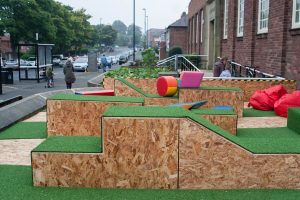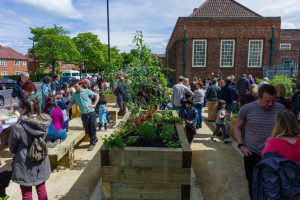How do you get communities more involved in their local environment? What changes can be made that can really make a difference to surroundings with a limited budget?
This post from Lecturer in Architecture Daniel Mallo explains how a project in Fenham in Newcastle helped the local community realise a different vision for their public space. This post first appeared on the HASS Research Impact blog.
*
The Pocket Park idea came about almost by accident. Fenham Ward, in the West End of Newcastle, had received some funding for a Sustrans DIY Streets Project to involve local people in improving their area, making streets less car focused and more generally ‘help them redesign their neighbourhoods putting people back at their heart.’ Through an ESRC IAA grant we supported Sustrans’ work by strengthening community aspirations and sparked inspiration into the potential of their local environment.

DIY Streets Fenham
To begin with we used various methods to find out how residents felt about their local area. We built a basic scale model encouraging locals to interact with it, helping them imagine what could be possible. Temporary wooden seats were also placed along the street where cars normally parked so residents could see the impact of making these changes in a more physical way.
Later we conducted a focus group using large photographs of the street that could be sketched over, to foster further discussion amongst participants. During these different stages local people identified a need for a place where they could sit and watch the world go by. Many residents also commented that the library, swimming pool and doctors surgery on Fenham Hall Drive formed a community hub but that there was nowhere to wait for their children. Taking these ideas into consideration the project concluded with a pop-up public/play space between the library and pool for four days, which gave members of the public, residents and other stakeholders the opportunity to experience the potential impact of a public space in the area. This temporary space showed, more than a model or image could ever do, the way in which people could change their environment for the better.
All of these experiences strengthened the desire for the community and all the various partners involved – members of the City Council, local residents, Fenham Association of Residents, Fenham Library, Fenham Swimming Pool, Sustrans, Your Homes Newcastle, Newcastle University and Fenham New Model Allotments – to seek funding for what they now call a hub for Fenham Hall Drive. A group of local people, in partnership with Fenham Association of Residents, were successful in being awarded £15,000 from the Department of Communities and Local Government to build a Pocket Park, which opened on Saturday 21 May 2016.

Pocket Park Opening
After the park had been created, participants in the project formed the Friends of Fenham Pocket Park, a community group that helps promote the use of the space by local residents and visitors of all ages, alongside a chance for people to volunteer, learn new skills and help support the Pocket Park’s maintenance and future development.
Cllr Marion Talbot, a City Council ward member for Fenham who was involved in the project from the beginning, was interviewed about the Pocket Park when it was opened this year. She said that “it has been refreshing the way residents, community groups and organisations have all joined together to make this project happen; and unite with a common goal of providing something extra special for the area and forging invaluable working relationships that could prosper in years to come.” You can also read Cllr Talbot’s blog post about her experience of working with the University.
From a research point of view the process of collaboration between various groups throughout this project was thought-provoking. It put the different participatory design approaches we use to the test and at the same time helped local people plan a useful space that is beneficial to the whole community. The project only ran for 18 months however it has had a lasting impression on Fenham and its residents: that is the best kind of impact any research can have.
*
Daniel Mallo is Lecturer in Architecture in the School.
Daniel.Mallo@ncl.ac.uk
